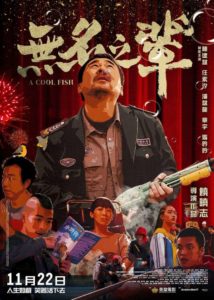A Cool Fish
无名之辈
China/Hong Kong, 2018, colour/b&w, 2.35:1, 108 mins.
Director: Rao Xiaozhi 饶晓志.
Rating: 8/10.
Criss-crossing black comedy boasts a precision script and some fine performances, especially by lead actor Chen Jianbin and actress Ren Suxi.
Qiaocheng city, Guizhou province, southern China, the present day, summer. Moneylender Liu Wu (Deng Gang) protests publicly against property developer Gao Ming (Wang Yanhui) – who has skipped town after borrowing money for a housing project that has stalled – by humiliating one of Gao Ming’s security guards, Ma Xianyong (Chen Jianbin), a widowed former policeman who was sacked after crashing a car while drunk. A fight breaks out, which is quelled by the police, led by Ma Xianyong’s former colleague, detective Ren Xiaochong (Fan Wei), who again refuses Ma Xianyong’s request to be allowed to join the auxiliary police unit. Meanwhile, two armed gunmen from the countryside – Hu Guangsheng, aka Cobra (Zhang Yu), and Li Haigen, aka Da Tou (Pan Binlong) – have robbed a mobile-phone shop next to a bank and broken into the flat of the crippled Ma Jiaqi (Ren Suxi) to hide out. The wheelchair-bound Ma Jiaqi shrugs off their threats to kill her and even starts bossing the two hopeless criminals around. Her randy neighbour, Wang Shuncai (Jiu Kong), hears a commotion but she won’t let him in. Hearing  about the robbery, Ma Xianyong makes his own enquiries, and suspects that a rifle used in the hold-up is his own, which went missing. He follows the police as they go to arrest Chen Bobo (Xie Bo), head waiter at massage parlour Le Rêve Parisien 梦巴黎, whom they’ve misidentified as one of the robbers. Chen Bobo escapes but is caught by Ma Xianyong, who demands his rifle back; angered, Chen Bobo says he never had it and suggests he contacts Zhao Hongxia, aka Zhenzhen (Ma Yinyin), a masseuse at Le Rêve Parisien who is the sweetheart of robber Li Haigen. Ma Xianyong finds Zhao Hongxia busy with Wang Shuncai; but after throwing him out the police arrive and arrest everyone. Ma Xianyong’s teenage daughter Ma Yiyi (Deng Enxi), who is at the same high school as Gao Ming’s son, Gao Xiang (Ning Huanyu), goes to report to the police that Gao Xiang is arranging a gang fight that evening at Xishan bridge to defend his fugitive father’s honour; but when she sees her father being led into the station with the masseuses, she storms off instead. In their hideout the two robbers learn from the TV news that the phones they stole are worthless. Suddenly, Ma Jiaqi starts urinating uncontrollably in her wheelchair and, breaking down as she remembers how her life was destroyed by the car crash, asks the two robbers to help her take her own life. They take pity on her, and Hu Guangsheng starts to fall for her. Meanwhile, a big showdown for everyone looms at Xishan bridge that evening, with even Gao Ming, who’s decided to come back and face the music after being nagged by his lover (Cheng Yi), also on the scene.
about the robbery, Ma Xianyong makes his own enquiries, and suspects that a rifle used in the hold-up is his own, which went missing. He follows the police as they go to arrest Chen Bobo (Xie Bo), head waiter at massage parlour Le Rêve Parisien 梦巴黎, whom they’ve misidentified as one of the robbers. Chen Bobo escapes but is caught by Ma Xianyong, who demands his rifle back; angered, Chen Bobo says he never had it and suggests he contacts Zhao Hongxia, aka Zhenzhen (Ma Yinyin), a masseuse at Le Rêve Parisien who is the sweetheart of robber Li Haigen. Ma Xianyong finds Zhao Hongxia busy with Wang Shuncai; but after throwing him out the police arrive and arrest everyone. Ma Xianyong’s teenage daughter Ma Yiyi (Deng Enxi), who is at the same high school as Gao Ming’s son, Gao Xiang (Ning Huanyu), goes to report to the police that Gao Xiang is arranging a gang fight that evening at Xishan bridge to defend his fugitive father’s honour; but when she sees her father being led into the station with the masseuses, she storms off instead. In their hideout the two robbers learn from the TV news that the phones they stole are worthless. Suddenly, Ma Jiaqi starts urinating uncontrollably in her wheelchair and, breaking down as she remembers how her life was destroyed by the car crash, asks the two robbers to help her take her own life. They take pity on her, and Hu Guangsheng starts to fall for her. Meanwhile, a big showdown for everyone looms at Xishan bridge that evening, with even Gao Ming, who’s decided to come back and face the music after being nagged by his lover (Cheng Yi), also on the scene.
REVIEW
Following his black comedy The Insanity 你好,疯子! (2016), theatre and TV writer-director Rao Xiaozhi 饶晓志, 38, builds on all the strengths of that first movie – an ensemble cast, absurdist humour, unexpected changes of mood – but in a more cinematic way with A Cool Fish 无名之辈. Again collaborating with theatre writer Lei Zhilong 雷志龙, 34, Rao has come up with an original work rather than an adaptation of a play and seems liberated by what film can offer in a criss-crossing ensemble comedy. Where The Insanity focused on a group of strangers who find themselves in a mental asylum and have to prove they’re “normal”, Fish presents the audience with a motley selection of characters in a provincial city who are all imprisoned in their private madnesses and turn out to be connected in revealing (and sometimes moving) ways. Constructed with Swiss Clock precision – and, unlike some similar comedies, not running out of breath in the final furlong – Fish hooks the viewer with well-developed characters and finely tuned performances from a cast with stage experience. Unlike the earlier film, which flopped at the Mainland box office with a mere RMB16 million, Fish has reeled in almost RMB800 million in four-and-a-half weeks. [Final tally was RMB795 million.]
Set in a fictional city in Rao’s native province of Guizhou, southern China, the film has a lot of fun with the cast speaking in broad dialect but doesn’t have a plot that relies just on regional colour. In short order, the basic characters are introduced: two incompetent armed robbers from the countryside (leading to a wonderful visual joke involving their motorbike); a security guard who thinks they used his rifle and is anxious to get it back; a paraplegic in whose flat the robbers hide out by chance; her randy, inquisitive neighbour; a corrupt property developer on the run; his son and the security guard’s daughter, both at the same high school; a sleazy character at a massage parlour who’s been mis-identified by the police as one of the robbers; and a “masseuse” who’s the sweetheart of one of the robbers. Between them all run the local police, as they try to track down the robbers, and the security guard who was once a policeman himself.
Much of the early going cross-cuts between the two bozo robbers in the flat and the security guard’s private mission to track them (and his gun) down. The former scenes owe much to terrific comic playing by Shandong-born theatre actress Ren Suxi 任素汐, 30, who was so good in the absurdist period comedy Mr. Donkey 驴得水 (2016). As the wheelchair-bound woman who initially humiliates the two robbers with her fearlessness but later forms a genuine emotional bond with them that’s both joyous and sad (with a refreshing lack of any political correctness), Ren is again among the most memorable players. The later rooftop scenes with the three – following a major plot revelation – are among the best in the film, with good chemistry with Guizhou native Zhang Yu 章宇 (the blank-faced ruffian in hit Dying to Survive 我不是药神, 2018) as the more crazed robber and stand-up comic Pan Binlong 潘斌龙 (The Way of the Bug 猛虫过江, 2018) as the quieter one.
Paralleling their playing, top-billed veteran Chen Jianbin 陈建斌, 48, in his first film since directing and starring in the rural indie A Fool 一个勺子 (2014), anchors the movie with gentler comedy as the washed-up security guard who’s owed money by his boss, is despised by his teen daughter and is desperate to rejoin the police force he was ignominiously sacked from. As his search for the missing gun leads his path to cross with the robbers – via a cheeky “masseuse” (nicely played by Yunnan-born singer Ma Yinyin 马吟吟, 20, in her big-screen debut) – the plot finally gathers all its characters together for a nocturnal showdown on the city’s touristy Xishan bridge.
Milling around in the supporting cast are goofy Taiwan comic Jiu Kong 九孔, fairly reined-in here as the paraplegic’s randy neighbour; 13-year-old Deng Enxi 邓恩熙 – so good as the niece in the subsequently shot Last Letter 你好,之华 (2018) – as the security guard’s daughter; and veteran Wang Yanhui 王砚辉, another actor with theatre background, as the fugitive property developer. Both Wang and Deng’s roles are underwritten – as is that of singer Ning Huanyu 宁桓宇 as the developer’s son – but it’s difficult to see how they could be expanded without slowing down the film.
As on The Insanity, Rao has used a quality tech crew, from Hong Kong’s Xu Hongyu 许宏宇 [Derek Hui] as supervising editor through Lan Bing 蓝冰 (The Insanity) as stylist to prize-winning still photographer Li Jian 李剑 as d.p., who shows considerable versatility in catching the film’s changing moods. The film was shot in Duyun city, Guizhou province. The Chinese title literally translates as “The Nameless Generation”, in the sense of “Nobodies”, either of which is more germane than the meaningless English one. An earlier Chinese title for the film was 慌枪走板.
CREDITS
Presented by Emperor Motion Pictures (Beijing) (CN), Beijing Culture (CN), Emperor Motion Pictures (HK), Shanghai Zhengfu Film & TV Culture (CN), Horgos Youngsome Pictures (CN), Shenzhen Yiyi Yiyi Culture Communication (CN).
Script: Rao Xiaozhi, Lei Zhilong. Photography: Li Jian. Editing: Xu Hongyu [Derek Hui], Zhou Yuan, Yang Zhifeng. Music: Deng Ouge. Art direction: Wang Diandian. Styling: Lan Bing. Sound: Lv Yan, Jiang Jianqiang. Action: Chen Jiafu.
Cast: Chen Jianbin (Ma Xianyong), Ren Suxi (Ma Jiaqi), Pan Binlong (Li Haigen/Li Datou), Zhang Yu (Hu Guangsheng/Cobra/Bra), Ma Yinyin (Zhao Hongxia/Zhenzhen), Wang Yanhui (Gao Ming), Cheng Yi (Liu Wenhong), Ning Huanyu (Gao Xiang, Gao Ming’s son), Deng Enxi (Ma Yiyi, Ma Xianyong’s daughter), Jiu Kong [Lv Kongwei] (Wang Shuncai, Ma Jiaqi’s neighbour), Xie Bo (Chen Bobo/Bozi/Bobby), Fan Xiang (Ren Xiaochong, police detective), Zhao Zichong (Huang Wei), Shi Ce (Guo Menglu), Ma Ruihan (Xiang Jie), Lin Hai (Yu, manager), Deng Gang (Liu Wu), Yao Shisan (vagrant singer), Guo Yiqian (bank guard), Wang Piaopiao (MC), Gao Hua (presenter), Xu Qianqian (Wu, headmistress), Zhu Dandan (Ma Xianyong’s wife).
Release: China, 16 Nov 2018; Hong Kong, 22 Nov 2018.
